News
What Happened to Toni Lane Casserly, the “Joan of Arc of Blockchain” Who Died in Her Childhood Home?


She sits in an off-white easy chair in a nondescript room. She’s relaxed yet radiant, her dark eyes dancing with anticipation. Across from her, an interviewer, a seemingly affable dude in a graphic tee, grins and points. That’s her cue. She flutters her fingers outward from her face. Her painted lips part. “I’ll beeeee seeing youuuuu / In all the old familiar places.…” Toni Lane Casserly, channeling Billie Holiday, sings the classic song a cappella with just about perfect pitch. The dude swoons.
You wouldn’t know it from the cold open, but this is a conversation about the blockchain technology that fuels cryptocurrencies. About the new world order Toni is working to construct, an inverted model of society as we know it.
The date is December 7, 2018. Toni is 27 and industry-famous, at the top of her game. As one of the few women in crypto, she stands out, not just because of her gender but because of her style—free-flowing, jazzy—and her values. While many of her peers hole up in hacker houses and race to pump out “magic internet money,” as one bluntly puts it, Toni worries over issues like state violence, mass dispossession, disaster-fueled climate migration, and the gatekeeping of wealth by the ruling class. Let us not turn away, she counsels. Together we can fix this. We must.
Part of the solution, she believes, are blockchains—permanent digital ledgers maintained by decentralized networks of computers. These data banks store documents and financial transactions; they keep score. And ultimately, Toni preaches, they will introduce a new kind of accountability, put control in the hands of the people, and shift the paradigms of global power.

Her passion is compelling, seductive even, and hits with a sense of authority. She’s been in the blockchain field for half a decade, ever since she bailed on a communications program at the University of Texas, leaving behind her family and theater-kid roots for the burgeoning crypto scene of the Bay Area. Her first job, at a bitcoin tipping company later acquired by Airbnb, was just the start. A genius networker, she soon parlayed her prolific people skills into more impressive roles. In 2015, she was named CEO of Cointelegraph, a publication that chronicled crypto news and intrigue and connected her with its biggest players. She then homed in on consulting, making a name for herself as a marketing whisperer for companies like the stablecoin Tether.
Toni’s big dream, though, is to launch a blockchain start-up of her own. She’s written a pitch deck for one called Cultu.re, which would issue and track personal identity and ownership documents, like blockchain marriage certificates and property deeds. Users would no longer be reliant on corrupt governments or financial institutions for these things. Even more exciting, her ecosystem would assign each of its members a peer-to-peer social credit score of sorts—a trustworthiness metric that would band people together and “leverage good behavior to redistribute resources.” In fiery talks at events, from the Japan Blockchain Conference in Tokyo to the Crypto Symposium in Mykonos, Toni positions Cultu.re as a means to “destroy the state.” Via YouTube, her presentations reach tens of thousands around the world. Industry media hail her as a young star. She earns a nickname: the Joan of Arc of Blockchain.
Toni is relentless in her mission—until one day, she isn’t. Not even a year from now, she will suddenly drop off the map, both metaphorically and literally. Her social media accounts will sit silent. Friends won’t hear from or about her for six months, until the spring of 2020, when Toni’s mother will find her body, malnourished and unresponsive, in her childhood bedroom.
Those who knew Toni, including the dozens of her friends, family members, and associates interviewed for this story, will be shattered and mystified by her death. How could this vibrant young woman, beloved and admired by so many, disappear?
In piecing together, for the first time, the major events of her final months, an answer arises. And it feels like a clarion call.

Hair tied back, Toni stooped to pull weeds among the majestic redwoods. She was helping tend the grounds at Genesis, a 40-acre property north of Santa Cruz that had, in the ’70s and ’80s, housed an alternative college, the University of the Trees.
Genesis was a special place for Toni—part time-share, part think tank, part hippie commune. Member-owners joined by buying blockchain tokens, which allowed them to stop in for consciousness building, nature vibes, and more. In charge of day-to-day operations were two of her friends: crypto trader Sean Ironstag and musician/DJ Geo Star, both Burning Man regulars perpetually dressed for the playa.
Toni’s stake in Genesis was more ideological than financial. She wasn’t a member, exactly; she was more of a chronic visitor who passionately identified with its purpose. Plus, living out of a suitcase was kind of her thing, says Ironstag. He’d met Toni in the primordial bitcoin sphere years earlier, when they bonded over a seething distrust of financial institutions. Ironstag, in fact, was a convicted felon, having served time for forgery. (“I found a way to really fuck the digital banking system,” he says.) Toni didn’t judge. At various gatherings, the two friends stayed up late, deep in conversation.
During this holiday stopover, though, things at Genesis had started to lose their luster. Toni learned her cherished sanctuary was in trouble: A third cofounder, who controlled the property, wanted the others out. Normally, Toni carried herself with an almost maternal confidence that made you believe good would always prevail. But this news seemed to activate a kind of protective rage. “She was really pissed,” says Ironstag, from where he and Star sit poolside at the Palm Springs Ace Hotel years later.
Jaw set, Toni assured her friends this vital collective would not dissolve on her watch and vowed to give the cofounder “a harsh talking-to,” Ironstag remembers.
That meeting with the cofounder tested the limits of Toni’s persuasive power, in rare battle mode against someone else’s business interests. “[He] is now reversing his agreed upon terms and saying he would not like to engage in a peaceful dialogue,” she texted Ironstag. Within weeks, Genesis was no more.

EV MARQUEE

An ocean breeze blew gently as Toni rang in the New Year, cocktail in hand, partying alongside her illustrious host, crypto baron Brock Pierce. Toni had a “permanent invite” to pretty much any event he threw. “She was part of the inner circle of the industry,” says Pierce. “You weren’t in the business if you weren’t friends with Toni.”
Toni built loyalty by going to bat for other people’s ideas on the global stage. Thanks to her performance chops, she could crush a keynote—a gift that Pierce, a former teen movie actor, respected and leveraged. “Toni could explain a project’s mission better than the founder or CEO,” Pierce says. “She was a very good storyteller, very good at delivering the message. That skill set is rare.”
In 2018, Toni traveled the world with Pierce, hyping his new blockchain token EOS (the effort raised some $4 billion in crowdfunding before running into trouble with government regulators, one of several legal situations Pierce has faced in his career). She also publicized Pierce’s efforts to attract crypto investors to Puerto Rico after Hurricane Maria devastated the U.S. commonwealth, killing nearly 3,000 people there. The hope, she said, was that Silicon Valley transplants would introduce tech initiatives aimed at “empowering Puerto Ricans with the tools to solve their own problems.”
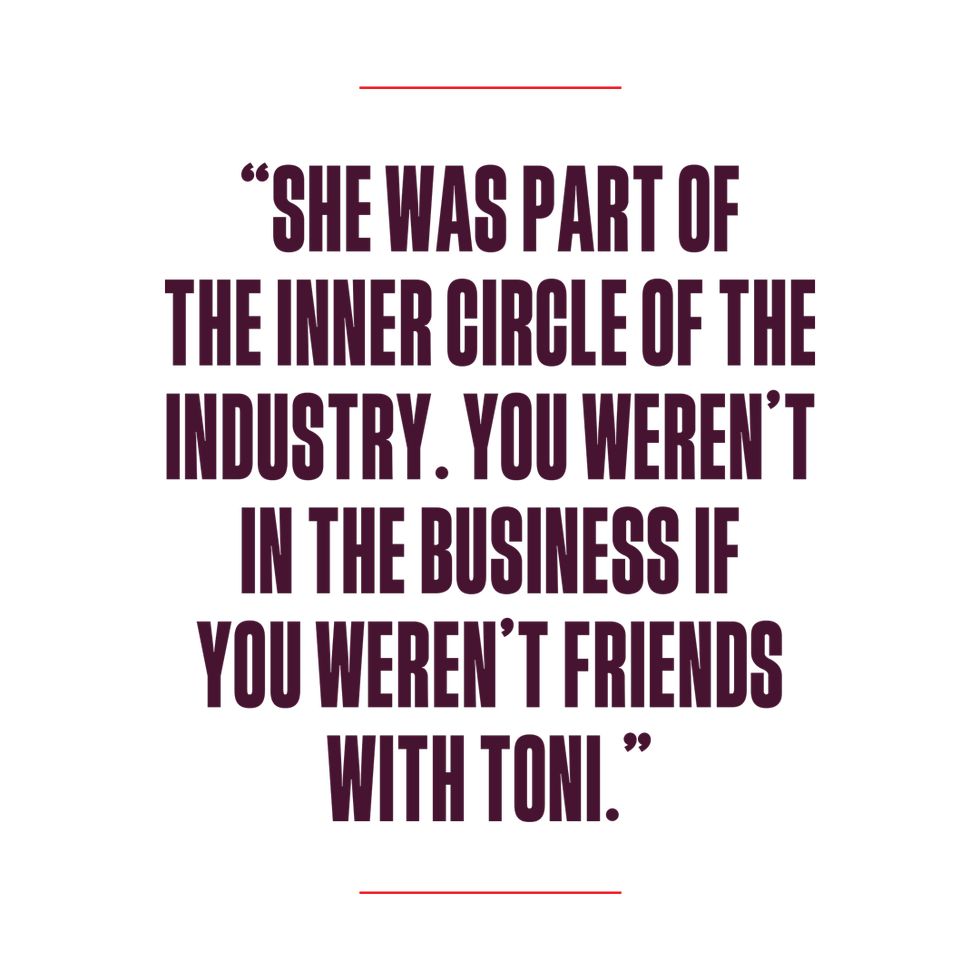
Multiple insiders say the kind of work Toni did was rarely salaried. She likely received stipends in the form of highly volatile blockchain tokens. Allen Rowe, a mostly retired crypto investor who worked as Toni’s virtual executive assistant in 2018, says speaking fees appeared to be her main source of income. She set her base rate at around $5,000 plus travel costs but often settled for less than half of that. “I don’t think she ever felt she was paid fairly,” says Rowe, who earned the equivalent of $2,500 a month in Bitcoin and Ethereum working for Toni. (A single Bitcoin valued at $3,800 at the beginning of 2019 would be worth more than $71,900 as of April 2024.)
Pierce himself certainly never had Toni on payroll, he says. “I think of her as someone that worked tirelessly on behalf of the industry and was balling on a budget.”
Years later, as Pierce leaves a fancy dinner in San Juan, he’s still thinking about Toni. He and his fellow VIP guests pile into Teslas and head to a party in a gated community, gliding past walls graffitied with “Gringo go home.” It’s clear Pierce and the other investors he and Toni once hoped to attract haven’t delivered. What would Toni think if she could see this now?
“Some of the things she was working on still may get done,” Pierce says. “Her ideas were not wrong, just a little too early. Toni was basically a woman living in the future.”


Seemingly energized by the promise of new opportunities in the year ahead, Toni made stops at two major events. First up: Peer Summit in Utah, an invitation-only ideas festival held at an eco-conscious ski resort called Powder Mountain. There, wealthy blockchain innovators would converge to shape the industry, which Toni hoped would soon include Cultu.re.
She soaked in the resort’s communal hot tub surrounded by megamillionaires, despite the fact that she was often leery of powerful men. In past Facebook posts, she’d alluded to business meetings where prospective male investors had propositioned and even assaulted her. Never shy about denouncing the misogyny she’d encountered, she still did her best to focus on her mission. At Powder Mountain, that meant turning on the charm and riffing on her Cultu.re spiel for her audience. “Ninety percent of them could have personally financed the seed round of her start-up,” says Ryan Singer, a friend of Toni’s who was there.
They’d met in San Francisco around 2013, a duo of opposites—Singer, a soft-spoken tech nerd; Toni, a cosmic social star. Their relatively humble backgrounds united them, two millennials hustling to get by in an unaffordable city. By 2019, though, they were on different paths. Singer had held a number of leadership roles at start-ups and launched a few of his own, the latest being the blockchain company Chia Network. Unlike Toni, he had mastered the art of business combat.
Toni’s approach was more fake-it-till-you-make-it, acting the part of a moneyed insider. She told some people her father was an oil magnate. In reality, he runs a pool company. “She put a lot of effort into talking in a posh way,” Singer says. “She was very experimental with fashion—a lot of big fur coats and hats.” He describes little tells in Toni’s facade, like her unfamiliarity with country club leisure pursuits. When many Peer Summit attendees peeled off for a ski outing, Singer (who stayed behind) has no memory of Toni joining.
Toni’s talents were of the raw, innate variety. At a dressy group dinner, Toni cued up the pianist and serenaded the crowd. “Everybody was entranced,” Singer remembers. Yet not quite enough to win Cultu.re the backing she needed. Despite the advisers Toni had tapped to help sketch out the basics, her company’s business plan (like many business plans) was vague and jargony, lacking the clear pathway to profitability that investors like to see. “Entrepreneurs need to be able to go back and forth between being idealistic and being able to do negotiations,” says Singer. “Toni only ever did that first thing. I never saw her play hardball with anyone.”
And after Utah, Singer would never see Toni again.

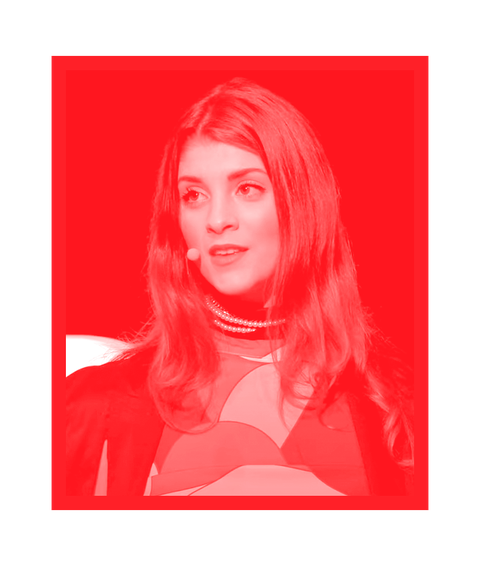
Wherever she showed up, Toni always brought a certain level of intensity—it’s how she made soulmates out of acquaintances. “There was no small talk with her,” says tech founder Lucian Tarnowski, a friend and frequent festival buddy. “It was all big, meaty concepts: systems change, societal design. We would have far-reaching conversations outside of the bounds of time.”
When he crossed paths with her in the Swiss Alps at the World Economic Forum, though, Toni seemed consumed by anguished urgency. At an event that week, “she broke down weeping for the state of the world,” Tarnowski says. “Bone-chilling weeping, like a mother who was losing a child.”
He pulled her aside to talk. As much as he respected his friend’s “superhuman powers to feel,” this seemed like a spiritual crisis. Toni confided that she was in a dark place: “Bad energies” were following her, she said. And she still hadn’t secured funding for her start-up.
“One of the things our society gets so wrong is that we don’t have an effective way of rewarding the people who are at the front lines trying to find ways out of this giant mess we’re in,” says Tarnowski, who is descended from Polish aristocracy. “They tend to be almost martyrs. Where is the capital to fund those kinds of people?”
A deeper question Toni may have been confronting: Was capital even the answer?
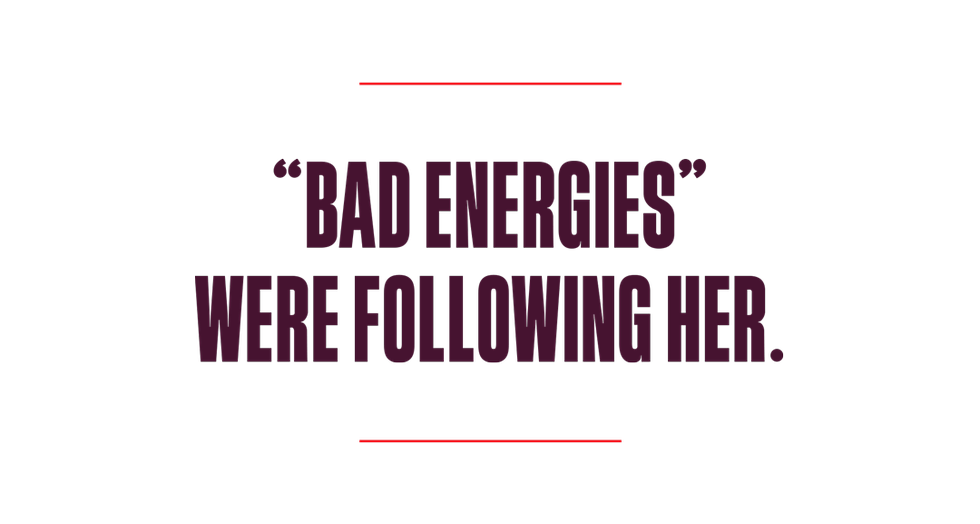

EV MARQUEE

Between conferences, Toni holed up at a San Francisco share house known as the Crypto Castle, home to a motley crew of blockchain coders and entrepreneurs. Toni had lived there intermittently since 2015. Back then, the scene was more college dorm than coworking space. Cheez-Its and comically oversized bottles of champagne were among the main food groups.
The proprietor, a baby-faced blockchain mogul named Jeremy Gardner, was a trusted friend. He and Toni had met on a date in 2014, and while the romantic chemistry wasn’t there, a potent rapport was. The timing was fortuitous: A few weeks after meeting Gardner, Toni got evicted from an apartment and asked to crash on his couch.
“My house for years became a home base for her whenever things went wrong,” Gardner says. The relationship wasn’t one-sided though. Having come up through the Occupy Wall Street movement, Gardner drew energy from Toni’s fierce idealism, even as he counseled her to be more pragmatic about her own business plan. They could be real with each other. In social settings, she referred to him as her brother, which was kind of nice for an only child to hear.
Eventually, Gardner began to branch out from crypto, launching a skincare line and moving to Miami. And by spring 2019, the Crypto Castle had welcomed a new cohort of more subdued renters. Gardner was happy to have Toni squeeze in…at first, anyway. Tenants weren’t thrilled by the stranger sleeping on the couch while they were trying to get serious work done. Gardner started getting complaints. And although Toni insisted she was paying him rent in Bitcoin, the funds never materialized.
Gardner never imagined his last correspondence with Toni would be about money, that she would just pack up her things and disappear. If he had been more aware of her precarious state, he would’ve taken a softer approach. “I just assumed she would show up at my door again one day,” Gardner says. “That’s what Toni did.”

One morning, Toni opened the encrypted messaging app Telegram to an inquiry from a woman we’ll call Narin. It was a simple note: Narin, a virtual reality influencer based in Türkiye, was looking to track down a writer from Cointelegraph. Could Toni put them in touch?
Toni wasn’t acquainted with the writer, but she and Narin struck up a friendly text exchange. As women leaders in different tech spheres, they admired each other’s expertise. Near-daily messages soon gave way to phone calls. Narin caught feelings and invited Toni to visit her in Istanbul. Narin would pay for everything, she assured Toni. A change of scenery didn’t sound like a bad idea. Off Toni went.
Narin thought of Toni as “more than a friend.” The two of them had fun together in Türkiye, sightseeing and souvenir shopping. She even introduced Toni to a photographer, who styled her in a personal portrait session.
For Toni, though, the trip wasn’t only a lark. Narin says Toni attended at least one business meeting at an opulent 5-star hotel, where a potential client in the banking industry was apparently interested in hiring Toni to advise on a blockchain-related project. But Toni’s excitement about the potential job, however lucrative it may have been, seemed out of character: Why would she consider a banking project when she had always railed against big banks? Wasn’t she trying to launch a start-up that would radically redistribute wealth?
All Narin can say now is that something shifted after that meeting. Toni announced she was leaving Istanbul and heading to London. “I was crying,” Narin remembers. In texts and calls from that point forward, Toni seemed cold and rude, like a completely different person. Another friend of Toni’s who saw her in London says Toni spoke of “seeing spirits.”

She was alone and in crisis. Around 2:30 p.m. on July 6, a Nevada state trooper spotted a young woman walking north along a bleak stretch of US-395 just north of Reno. The temperature was a scorching 91 degrees. The woman, Toni, was dressed in black, trudging along in high-heeled boots. The trooper stopped and offered a ride, which Toni declined, according to police records. The trooper then ordered her to exit the highway a short distance up ahead and left her to it. Pedestrians weren’t allowed out there.
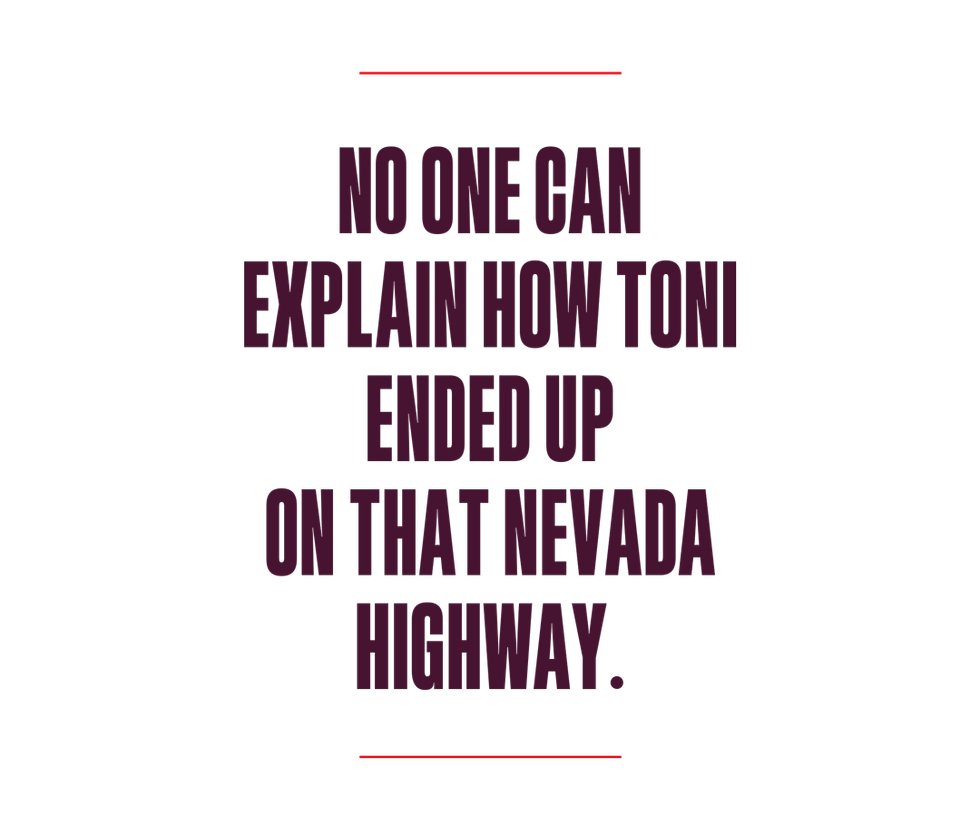
Toni had traveled hundreds of miles from California in the days prior. On July 1, she’d left a now-defunct spiritual retreat center near Tahoe, where something had gone awry. (“Due to a serious misalignment of values, I am looking for a new place to live as of TODAY!” she wrote in a Facebook post.) She then showed up at a friend’s Fourth of July party in San Francisco carrying her belongings in garbage bags, only to depart abruptly.
No one can explain how Toni ended up on that Nevada highway, where she walked for miles, at one point turning south. Another officer, responding to a dispatch call along with emergency medical responders, found her around 8:30 p.m. near the Reno-Tahoe International Airport. EMTs determined Toni’s condition was stable. She wasn’t dehydrated or suicidal (she wasn’t carrying drugs or weapons either). The trooper gave her a ticket and pointed her toward an exit just south of where they stood. If he saw her here again, he warned, she’d be subject to arrest.
An hour and a half later, he circled back. Toni was still there, this time north of where he’d last seen her, claiming she couldn’t find the exit. She was arrested, booked at the Washoe County jail on a misdemeanor charge, and then sent back out into the world.

EV MARQUEE

“I’m going to be in San Francisco—can I crash with you for a day or two?” Software engineer Austin Hyland was surprised when he got the text from Toni. They’d met at a blockchain conference in L.A. a couple of years prior, but they weren’t super close. Just business associates, he says (at one point, they’d discussed Hyland working with Cultu.re). No matter though. He invited her over. Anything for a pal in need.
Toni arrived carrying just a few items of clothing, without cash or credit cards. And while in one sense this might seem normal for Toni—she was all about non-government-backed currency, after all—she also seemed weirdly withdrawn. She didn’t want to talk about work or the state of the planet or much of anything at all. Had something happened?
Hyland, not knowing her very well, didn’t want to pry. “I kind of just did my best to make sure she was safe and comfortable,” he says. He tagged along as she roamed the city aimlessly, dressed in Hyland’s sweats and hoodies. After 10 days, she took off without disclosing her next move.

Toni did seek support for mental health at various points in her life. Norwegian therapist Alanja Forsberg first encountered Toni as a client at a 2018 retreat in Boulder, Colorado. Forsberg’s therapeutic approach is based on psychodrama, she explains, a group technique developed in the 1920s that incorporates elements of improvisational theater.
Toni was one of about 30 people at the retreat. She focused on unpacking sexual trauma in her past—experiences with perpetrators she chose not to report to authorities and sometimes declined to name even in private conversations. Among those suspected by friends was a prominent male figure in the crypto industry whom several other women, speaking on background, describe to Cosmopolitan as predatory and dangerous. “Most people don’t want to feel their deepest pain,” Forsberg says now via video call from Norway. “Toni went to the pain and she stood there; she fucking stayed in it.” She and Toni kept in touch, with Forsberg serving as an informal adviser of sorts.
But now Toni was FaceTiming Forsberg from an unknown airport, her usual fearless demeanor gone. She was in heightened distress, eyes darting around wildly. “She was saying, ‘They are coming after me. They are coming after me,’” Forsberg remembers. “I was like, ‘What the fuck is going on? Who are they? Who?’ I didn’t understand if she was scared of physical people in this world or spirits in other realms.”
The call ended without clear answers. Toni later resurfaced via text, seemingly in a calmer state. “I woke up this morning and wanted to fly to come to train with you. Would you be open to that?” she wrote. “I’ve been on a big journey in my healing work. My consciousness is growing.”
Forsberg wasn’t in a position to take on clients at the time. Her husband was sick; she was at capacity. Her eyes well up as she recounts this final exchange. Saying no to Toni would become “the sentence I’ve regretted most in my life.”

EV MARQUEE

Somehow, Toni found her way back to her Texas hometown. That in itself was noteworthy. Toni had been out of touch for years. Her father, Nick Casserly, says he and Toni had been close before she went down the blockchain rabbit hole. He admits he wasn’t supportive. In 2013, they’d fought over money and her lack of commitment to college. Once Toni left home, “she didn’t remain in much contact,” Nick says in an email. “She had many friends who were fiercely loyal to her.”
A high school friend confirms this, describing Toni as “so funny and smart and interesting, you were completely drawn to her. You could tell that she needed to be even bigger, and you’re like, You don’t need to be more. You’re already amazing.”
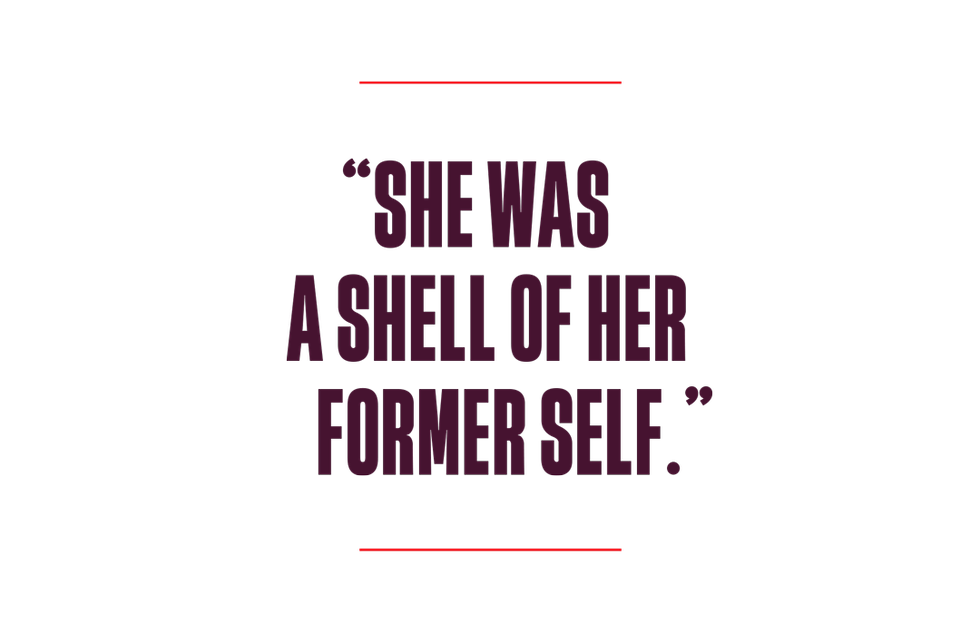
Ryan Lynch had a brief relationship with Toni in college and describes their connection as deeply spiritual. “I loved her with all my heart,” he says. “She was very complicated and hard to keep up with.” During their very first conversation in the University of Texas communications library, she engaged him for two hours on the topic of plant cultivation. Lynch, now a contractor, never stopped thinking or caring about Toni. In recent years, he’s become close with her mom. (Toni’s parents divorced when she was young, and her mother declined to comment for this story but did grant Lynch permission to share details of Toni’s final days.)
By the time Toni’s mother picked her up at the airport in August 2019, the only item in Toni’s possession was a phone. “She was obviously traumatized,” Nick says of his daughter’s emotional state, “a shell of her former self.” Toni didn’t want to see any doctors or leave her mom’s house. She spent her days snuggling with her mom’s dog, Boomer, strenuously avoiding her phone and other screens.

Toni left town again only once, in November 2019, for a high-profile speaking engagement at the Doha Debates in Paris. There, Toni would face off with a panel of other thought leaders on the question “Can we thrive without trust in government?” The debate should have been a slam dunk for Toni. But video of a one-on-one interview before the main event shows her on the defensive as the interviewer challenges her belief in blockchain technology as a replacement for nation-states.
“Do you vote?” the interviewer asks with a cool smile.
“I don’t engage in the current institutional political realm in any means,” Toni says. She’s pale; she looks tired.
The interviewer expresses smug surprise. “Wow, so you actively try not to participate in what arguably is your civic duty?”
Toni blinks, then responds. “I would say that my civic duty is that I take care of my neighbors when they get sick.”

Toni’s mom entered her daughter’s bedroom that morning to check on her. Toni hadn’t been well—fighting an infection of some kind, running a fever. For the entire month prior, she’d eaten almost nothing and continued to refuse medical care. Now, it was too late: Toni’s mother found her daughter in bed, dressed in plaid pajamas, unresponsive.
Nick Casserly announced Toni’s passing on Facebook soon after. Her far-flung crypto network responded with shocked confusion, swirling with conspiracy theories—that Toni had been murdered or brainwashed by a spiritual cult. Losing their beautiful, vibrant friend felt unimaginable. But the coroner’s report was definitive: Toni’s official cause of death was anorexia nervosa.
Anorexia has one of the highest mortality rates of all mental illnesses, says Allegra Broft, MD, an eating disorder specialist at NY-Presbyterian/Columbia University Irving Medical Center in New York City. While some people live for years with the condition, anorexia can lead to sudden death through medical complications such as cardiac arrest. Research shows that a large measure of people with eating disorders also meet the criteria for at least one other psychiatric disorder, such as depression, bipolar disorder, or PTSD. These co-occurring conditions can fuel one another, and successful treatment often requires a multidisciplinary care team. In cases when an adult declines professional support, “family members are often very helpless,” says Dr. Broft. She likens the experience to loving someone with a substance-use disorder. “There’s only so much you can do to intervene.”
Now, of course, everyone in Toni’s life wishes they had done more. The troubling signs were there. The subtle cries for help. The not-so-subtle ones too.
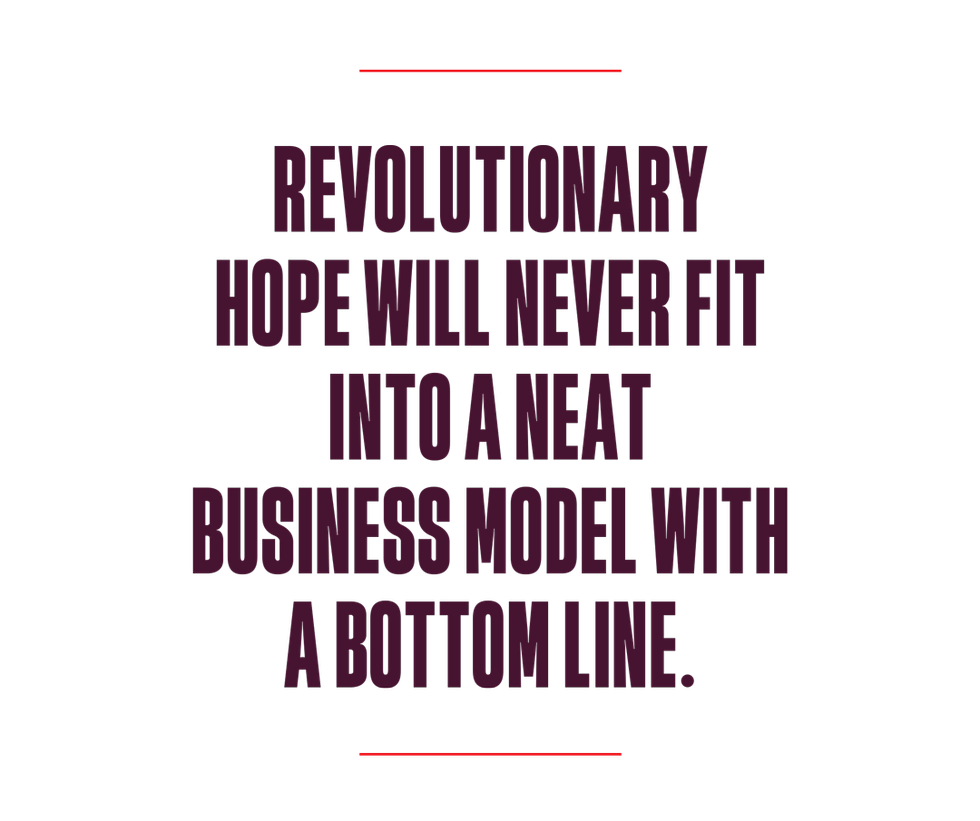

It was easy, maybe, to fault her decentralized lifestyle—no one was privy to the full scope of her life or inner world. “Everyone felt a tremendous amount of guilt,” says Gardner. “We can all blame ourselves a little for not being more proactive, for not reaching out to her or checking in on her.” And because she died early on in the COVID-19 pandemic, even Toni’s funeral was a shadow of what she deserved: a virtual memorial service over Zoom, where at least 20 people eulogized or made music in Toni’s memory. Lynch briefly tuned in from Texas. “I watched for a couple minutes but just couldn’t handle it,” he says. “Closed my laptop and just tried to bury it.” This proved impossible. Toni lived on in his dreams, lucid visions that startled him awake. Which was actually on-brand for Toni: “My real thesis on death is that we don’t actually die,” she mused in her public talks. “Your soul is potentially made up of every other soul that exists on Earth because every time someone touches you, they leave an imprint.”
Her own imprint is a cautionary parable, warning about the pressures we face to monetize our humanity, and a searing truth: Revolutionary hope will never fit into a neat business model with a bottom line.
Toni Lane Casserly died building a network. What she needed was community.
If you are struggling with disordered eating, consider reaching out to the National Association of Anorexia Nervosa & Associated Disorders helpline at 888-375-7767.
Jessica Klein is a freelance journalist whose work on cryptocurrency, intimate partner violence, and curious subcultures has appeared in publications including the New York Times, The Atlantic, Elle, GQ, Fortune, and The Guardian. As a contributing reporter at The Fuller Project, she received the 2021 NAJA National Native Media Award for Best Coverage of Native America.
News
Terra Can’t Catch a Break as Blockchain Gets $6 Million Exploited

The attack, which exploited a vulnerability disclosed in April, drained around 60 million ASTRO tokens, sending the price plummeting.
The Terra blockchain has been exploited for over $6 million, forcing developers to take a momentary break the chain.
Beosin Cyber Security Company reported that the protocol lost 60 million ASTRO tokens, 3.5 million USDC, 500,000 USDT, and 2.7 BTC or $180,000.
Terra developers paused the chain on Wednesday morning to apply an emergency patch that would address the attack. Moments later, a 67% majority of validators upgraded their nodes and resumed block production.
The ASTRO token has plunged as much as 75%. It is now trading at $0.03, a 25% decline on the day. Traders who took advantage of the drop are now on 195%.
The vulnerability that took down the Cosmos-based blockchain was disclosed in April and involved the deployment of a malicious CosmWasm contract. It opened the door to attacks via what is called an “ibc-hooks callback timeout reentrancy vulnerability,” which is used to invoke contracts and enable cross-chain swaps.
Terra 2.0 also suffered a massive drop in total value locked (TVL) in April, shortly after the vulnerability was discovered. It plunged 80% to $6 million from $30 million in TVL and has since lost nearly half of that value, currently sitting at $3.9 million.
The current Earth chain emerged from the rubble as a hard fork after the original blockchain, now called Terra Classic, collapsed in 2022. Terra collapsed after its algorithmic stablecoin (UST) lost its peg, causing a run on deposits. More than $50 billion of UST’s market cap was wiped out in a matter of days.
Terraform Labs, the company behind the blockchain, has been slowly unravelling its legal woes since its mid-2022 crash. Founder Do Kwon awaits sentencing in Montenegro after he and his company were found liable for $40 billion in customer funds in early April.
On June 12, Terraform Labs settled with the SEC for $4.4 billion, for which the company will pay about $3.59 billion plus interest and a $420 million penalty. Meanwhile, Kwon will pay $204.3 million, including $110 million in restitution, interest and an $80 million penalty, a court filing showed.
News
Google and Coinbase Veterans Raise $5M to Build Icebreaker, Blockchain’s Answer to LinkedIn

Icebreaker: Think LinkedIn but on a Blockchain—announced Wednesday that it has secured $5 million in seed funding. CoinFund led the round, with participation from Accomplice, Anagram, and Legion Capital, among others.
The company, which is valued at $21 million, aims to become the world’s first open-source network for professional connections. Its co-founders, Dan Stone and Jack Dillé, come from Google AND Monetary base; Stone was a product manager at the cryptocurrency giant and also the co-creator of Google’s largest multi-identity measurement and marketing platform, while Dillé was a design manager for Google Working area.
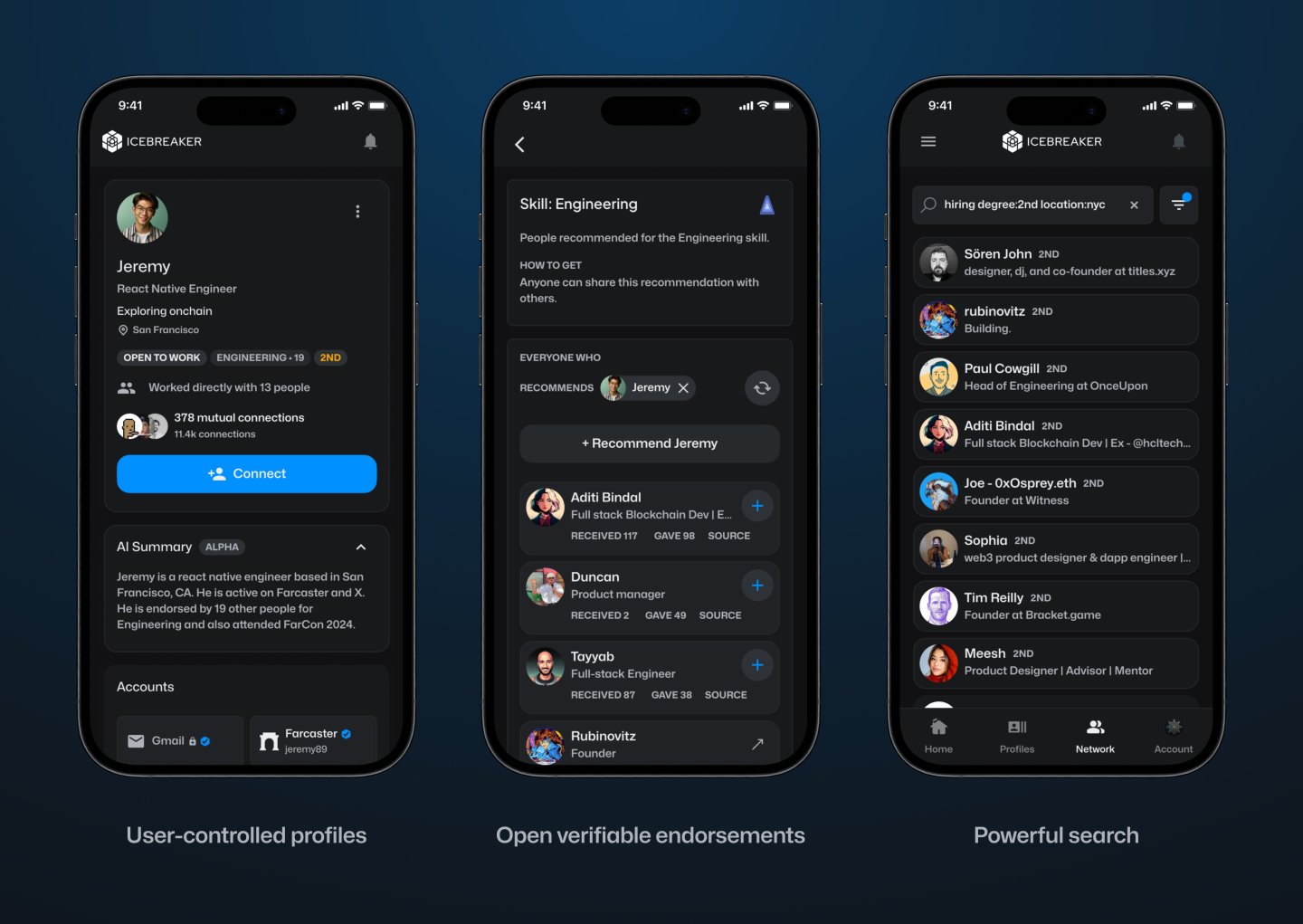
The pair founded Icebreaker on the shared belief that the imprint of one’s digital identity (and reputation) should not be owned by a single entity, but rather publicly owned and accessible to all. Frustrated that platforms like LinkedIn To limit how we leverage our connections, Dillé told Fortune he hopes to remove paywalls and credits, which “force us to pay just to browse our network.” Using blockchain technology, Icebreaker lets users transfer their existing professional profile and network into a single, verified channel.
“Imagine clicking the login button and then seeing your entire network on LinkedIn, ChirpingFarcaster and email? Imagine how many introductions could be routed more effectively if you could see the full picture of how you’re connected to someone,” Stone told Fortune.
Users can instantly prove their credentials and provide verifiable endorsements for people in their network. The idea is to create an “open graph of reputation and identity,” according to the founders. They hope to challenge LinkedIn’s closed network that “secures data,” freeing users to search for candidates and opportunities wherever they are online. By building on-chain, the founders note, they will create a public ledger of shared context and trust.
Verified channels are now launched for
Chirping
Online Guide
Wallet
Discord
Telephone
TeleporterYou can find them in Account -> Linked Accounts Italian: https://t.co/mRDyuWW8O2
— Icebreaker (@icebreaker_xyz) April 3, 2024
“Digital networking is increasingly saturated with noise and AI-driven fake personas,” the founders said in a statement. For example: Dillé’s LinkedIn headline reads “CEO of Google,” a small piece of digital performance art to draw attention to unverifiable information on Web2 social networks that can leave both candidates and recruiters vulnerable to false claims.
“Icebreaker was created to enable professionals to seamlessly tap into their existing profiles and networks to surface exceptional people and opportunities, using recent advances in cryptographically verifiable identity,” the company said, adding that the new funding will go towards expanding its team and developing products.
“One of the next significant use cases for cryptocurrency is the development of fundamental social graphs for applications to leverage… We are proud to support Dan, Jack and their team in their mission to bring true professional identity ownership to everyone online,” said CoinFund CIO Alex Felix in a statement.
Learn more about all things cryptocurrency with short, easy-to-read flashcards. Click here to Fortune’s Crash Course in Cryptocurrency.
Fuente
News
Luxembourg proposes updates to blockchain laws | Insights and resources

On July 24, 2024, the Ministry of Finance proposed Blockchain Bill IVwhich will provide greater flexibility and legal certainty for issuers using Distributed Ledger Technology (DLT). The bill will update three of Luxembourg’s financial laws, the Law of 6 April 2013 on dematerialised securitiesTHE Law of 5 April 1993 on the financial sector and the Law of 23 December 1998 establishing a financial sector supervisory commissionThis bill includes the additional option of a supervisory agent role and the inclusion of equity securities in dematerialized form.
DLT and Luxembourg
DLT is increasingly used in the financial and fund management sector in Luxembourg, offering numerous benefits and transforming various aspects of the industry.
Here are some examples:
- Digital Bonds: Luxembourg has seen multiple digital bond issuances via DLT. For example, the European Investment Bank has issued bonds that are registered, transferred and stored via DLT processes. These bonds are governed by Luxembourg law and registered on proprietary DLT platforms.
- Fund Administration: DLT can streamline fund administration processes, offering new opportunities and efficiencies for intermediaries, and can do the following:
- Automate capital calls and distributions using smart contracts,
- Simplify audits and ensure reporting accuracy through transparent and immutable transaction records.
- Warranty Management: Luxembourg-based DLT platforms allow clients to swap ownership of baskets of securities between different collateral pools at precise times.
- Tokenization: DLT is used to tokenize various assets, including real estate and luxury goods, by representing them in a tokenized and fractionalized format on the blockchain. This process can improve the liquidity and accessibility of traditionally illiquid assets.
- Tokenization of investment funds: DLT is being explored for the tokenization of investment funds, which can streamline the supply chain, reduce costs, and enable faster transactions. DLT can automate various elements of the supply chain, reducing the need for reconciliations between entities such as custodians, administrators, and investment managers.
- Issuance, settlement and payment platforms:Market participants are developing trusted networks using DLT technology to serve as a single source of shared truth among participants in financial instrument investment ecosystems.
- Legal framework: Luxembourg has adapted its legal framework to accommodate DLT, recognising the validity and enforceability of DLT-based financial instruments. This includes the following:
- Allow the use of DLT for the issuance of dematerialized securities,
- Recognize DLT for the circulation of securities,
- Enabling financial collateral arrangements on DLT financial instruments.
- Regulatory compliance: DLT can improve transparency in fund share ownership and regulatory compliance, providing fund managers with new opportunities for liquidity management and operational efficiency.
- Financial inclusion: By leveraging DLT, Luxembourg aims to promote greater financial inclusion and participation, potentially creating a more diverse and resilient financial system.
- Governance and ethics:The implementation of DLT can promote higher standards of governance and ethics, contributing to a more sustainable and responsible financial sector.
Luxembourg’s approach to DLT in finance and fund management is characterised by a principle of technology neutrality, recognising that innovative processes and technologies can contribute to improving financial services. This is exemplified by its commitment to creating a compatible legal and regulatory framework.
Short story
Luxembourg has already enacted three major blockchain-related laws, often referred to as Blockchain I, II and III.
Blockchain Law I (2019): This law, passed on March 1, 2019, was one of the first in the EU to recognize blockchain as equivalent to traditional transactions. It allowed the use of DLT for account registration, transfer, and materialization of securities.
Blockchain Law II (2021): Enacted on 22 January 2021, this law strengthened the Luxembourg legal framework on dematerialised securities. It recognised the possibility of using secure electronic registration mechanisms to issue such securities and expanded access for all credit institutions and investment firms.
Blockchain Act III (2023): Also known as Bill 8055, this is the most recent law in the blockchain field and was passed on March 14, 2023. This law has integrated the Luxembourg DLT framework in the following way:
- Update of the Act of 5 August 2005 on provisions relating to financial collateral to enable the use of electronic DLT as collateral on financial instruments registered in securities accounts,
- Implementation of EU Regulation 2022/858 on a pilot scheme for DLT-based market infrastructures (DLT Pilot Regulation),
- Redefining the notion of financial instruments in Law of 5 April 1993 on the financial sector and the Law of 30 May 2018 on financial instruments markets to align with the corresponding European regulations, including MiFID.
The Blockchain III Act strengthened the collateral rules for digital assets and aimed to increase legal certainty by allowing securities accounts on DLT to be pledged, while maintaining the efficient system of the 2005 Act on Financial Collateral Arrangements.
With the Blockchain IV bill, Luxembourg will build on the foundations laid by previous Blockchain laws and aims to consolidate Luxembourg’s position as a leading hub for financial innovation in Europe.
Blockchain Bill IV
The key provisions of the Blockchain IV bill include the following:
- Expanded scope: The bill expands the Luxembourg DLT legal framework to include equity securities in addition to debt securities. This expansion will allow the fund industry and transfer agents to use DLT to manage registers of shares and units, as well as to process fund shares.
- New role of the control agent: The bill introduces the role of a control agent as an alternative to the central account custodian for the issuance of dematerialised securities via DLT. This control agent can be an EU investment firm or a credit institution chosen by the issuer. This new role does not replace the current central account custodian, but, like all other roles, it must be notified to the Commission de Surveillance du Secteur Financier (CSSF), which is designated as the competent supervisory authority. The notification must be submitted two months after the control agent starts its activities.
- Responsibilities of the control agent: The control agent will manage the securities issuance account, verify the consistency between the securities issued and those registered on the DLT network, and supervise the chain of custody of the securities at the account holder and investor level.
- Simplified payment processesThe bill allows issuers to meet payment obligations under securities (such as interest, dividends or repayments) as soon as they have paid the relevant amounts to the paying agent, settlement agent or central account custodian.
- Simplified issuance and reconciliationThe bill simplifies the process of issuing, holding and reconciling dematerialized securities through DLT, eliminating the need for a central custodian to have a second level of custody and allowing securities to be credited directly to the accounts of investors or their delegates.
- Smart Contract Integration:The new processes can be executed using smart contracts with the assistance of the control agent, potentially increasing efficiency and reducing intermediation.
These changes are expected to bring several benefits to the Luxembourg financial sector, including:
- Fund Operations: Greater efficiency and reduced costs by leveraging DLT for the issuance and transfer of fund shares.
- Financial transactions: Greater transparency and security.
- Transparency of the regulatory environment: Increased attractiveness and competitiveness of the Luxembourg financial centre through greater legal clarity and flexibility for issuers and investors using DLT.
- Smart Contracts: Potential for automation of contractual terms, reduction of intermediaries and improvement of transaction traceability through smart contracts.
Blockchain Bill IV is part of Luxembourg’s ongoing strategy to develop a strong digital ecosystem as part of its economy and maintain its status as a leading hub for financial innovation. Luxembourg is positioning itself at the forefront of Europe’s growing digital financial landscape by constantly updating its regulatory framework.
Local regulations, such as Luxembourg law, complement European regulations by providing a more specific legal framework, adapted to local specificities. These local laws, together with European initiatives, aim to improve both the use and the security of projects involving new technologies. They help establish clear standards and promote consumer trust, while promoting innovation and ensuring better protection against potential risks associated with these emerging technologies. Check out our latest posts on these topics and, for more information on this law, blockchain technology and the tokenization mechanism, do not hesitate to contact us.
We are available to discuss any project related to digital finance, cryptocurrencies and disruptive technologies.
This informational piece, which may be considered advertising under the ethics rules of some jurisdictions, is provided with the understanding that it does not constitute the rendering of legal or other professional advice by Goodwin or its attorneys. Past results do not guarantee a similar outcome.
News
New bill pushes Department of Veterans Affairs to examine how blockchain can improve its work

The Department of Veterans Affairs would have to evaluate how blockchain technology could be used to improve benefits and services offered to veterans, according to a legislative proposal introduced Tuesday.
The bill, sponsored by Rep. Nancy Mace, R-S.C., would direct the VA to “conduct a comprehensive study of the feasibility, potential benefits, and risks associated with using distributed ledger technology in various programs and services.”
Distributed ledger technology, including blockchain, is used to protect and track information by storing data across multiple computers and keeping a record of its use.
According to the text of the legislation, which Mace’s office shared exclusively with Nextgov/FCW ahead of its publication, blockchain “could significantly improve benefits allocation, insurance program management, and recordkeeping within the Department of Veterans Affairs.”
“We need to bring the federal government into the 21st century,” Mace said in a statement. “This bill will open the door to research on improving outdated systems that fail our veterans because we owe it to them to use every tool at our disposal to improve their lives.”
Within one year of the law taking effect, the Department of Veterans Affairs will be required to submit a report to the House and Senate Veterans Affairs committees detailing its findings, as well as the benefits and risks identified in using the technology.
The mandatory review is expected to include information on how the department’s use of blockchain could improve the way benefits decisions are administered, improve the management and security of veterans’ personal data, streamline the insurance claims process, and “increase transparency and accountability in service delivery.”
The Department of Veterans Affairs has been studying the potential benefits of using distributed ledger technology, with the department emission a request for information in November 2021 seeking input from contractors on how blockchain could be leveraged, in part, to streamline its supply chains and “secure data sharing between institutions.”
The VA’s National Institute of Artificial Intelligence has also valued the use of blockchain, with three of the use cases tested during the 2021 AI tech sprint focused on examining its capabilities.
Mace previously introduced a May bill that would direct Customs and Border Protection to create a public blockchain platform to store and share data collected at U.S. borders.
Lawmakers also proposed additional measures that would push the Department of Veterans Affairs to consider adopting other modernized technologies to improve veteran services.
Rep. David Valadao, R-Calif., introduced legislation in June that would have directed the department to report to lawmakers on how it plans to expand the use of “certain automation tools” to process veterans’ claims. The House of Representatives Subcommittee on Disability Assistance and Memorial Affairs gave a favorable hearing on the congressman’s bill during a Markup of July 23.
-

 Videos12 months ago
Videos12 months agoCrypto News: Bitcoin, ETH Price, CPI Print, PYTH, WIF & MORE!!
-

 Videos11 months ago
Videos11 months agoCrypto News: Bitcoin Price, ETF, ETH, WIF, HNT & MORE!!
-
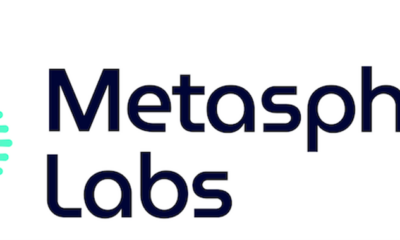
 DeFi11 months ago
DeFi11 months agoMetasphere Labs announces follow-up event regarding
-

 Videos12 months ago
Videos12 months agoSolana price potential?! Check out THIS update if you own SOL!!
-

 DeFi8 months ago
DeFi8 months agoPump.Fun Overtakes Ethereum in Daily Revenue: A New Leader in DeFi
-

 DeFi8 months ago
DeFi8 months agoDegens Can Now Create Memecoins From Tweets
-

 News8 months ago
News8 months agoNew bill pushes Department of Veterans Affairs to examine how blockchain can improve its work
-

 News8 months ago
News8 months agoLawmakers, regulators to study impact of blockchain and cryptocurrency in Alabama • Alabama Reflector
-

 Bitcoin8 months ago
Bitcoin8 months ago1 Top Cryptocurrency That Could Surge Over 4,300%, According to This Wall Street Firm
-

 Videos11 months ago
Videos11 months agoWho Really CONTROLS THE MARKETS!! Her plans REVEALED!!
-

 Ethereum11 months ago
Ethereum11 months agoComment deux frères auraient dérobé 25 millions de dollars lors d’un braquage d’Ethereum de 12 secondes • The Register
-

 Videos11 months ago
Videos11 months agoCryptocurrency News: BTC Rally, ETH, SOL, FTM, USDT Recover & MORE!

 ASTRO Price
ASTRO Price



